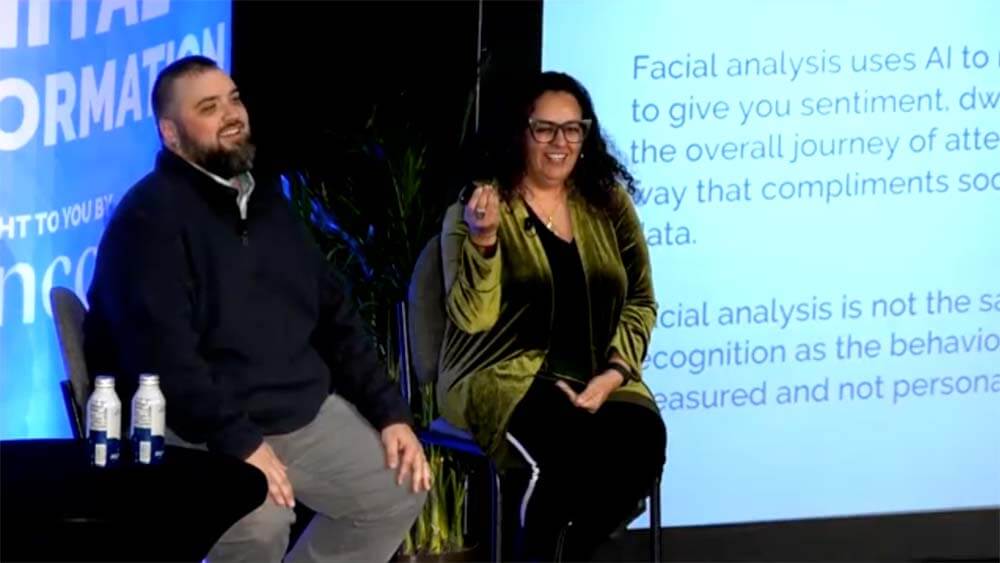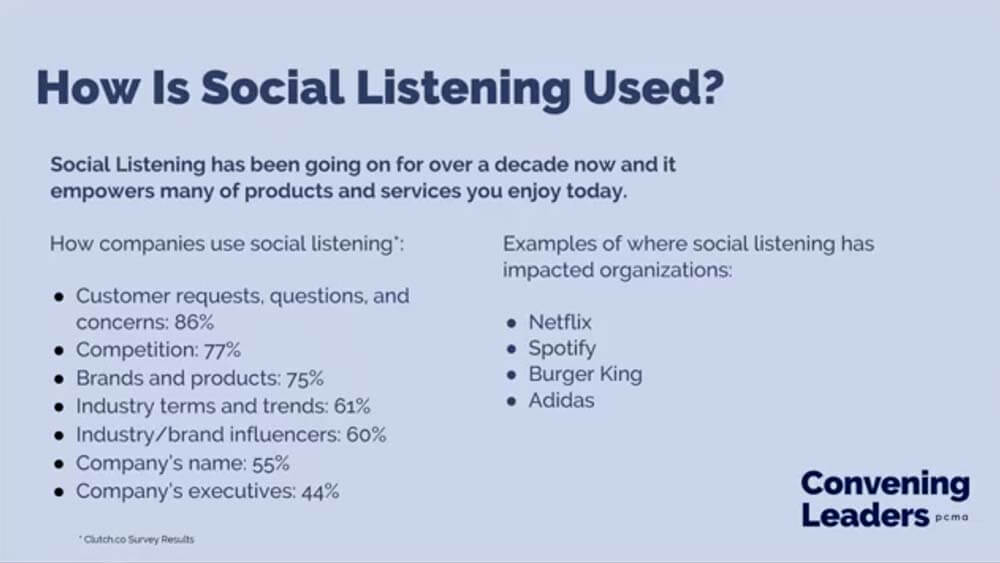
Nick Borelli, an events industry marketing strategy consultant, and Dahlia El Gazzar, founder of DAHLIA+ Agency, discuss the value of AI-powered social-listening tools at a Convening Leaders 2023 session.
The Convening Leaders 2023 session “Social Listening + AI = Deep Personalization” — led by Nick Borelli, an events industry marketing strategy consultant, and Dahlia El Gazzar, founder of DAHLIA+ Agency and an event tech expert — shared several fundamental lessons on the radical power of social listening. Also referred to as social-media measuring, social listening is the act of watching and analyzing content shared on social-media channels to glean valuable insights on a brand, organization, person, or event. Or, more simply, it’s “taking a temperature of your world,” Borelli said, “of your community, of the people that mean something to you,” and using that knowledge to design a better product.
Don’t mistake it for social-media monitoring, though. There are key differences — the first being that social-media monitoring is reactive, a tactic often hyper-focused around brand protection. Social-media listening is proactive, more of a strategy around combing through data to uncover broader insights and encourage better decision making.
“Social listening allows you to set the rules so you only get the data that is meaningful, that you know there is an action that can come from it,” Borelli said. AI-powered social-listening tools — like Mention, BuzzSumo, SproutSocial, and Brand24 — can speed up the process by gathering and sorting through the social-media noise to pinpoint valuable data as defined by your own parameters. And because it’s AI, you can train these tools to spot important keywords, negative keywords, and images to continually improve its search and data-mining abilities. Borelli compares it to cloning yourself. “AI,” he said, “allows you to perennially put parameters in there to build a mechanized ‘you.’”
Companies and organizations use social listening for a variety of reasons — most often for customer requests, questions, and concerns, according to a survey conducted by Clutch, a ratings and reviews platform for business services.

Social listening is a way to filter data to find something meaningful.
For event organizers, social listening can benefit most phases of their event lifecycle, from gauging audience sentiment around launch messaging to real-time feedback during the event and retention likelihood after the event has wrapped. “Most of us gauge our event’s success qualitatively against post-event surveys,” Borelli said. But typically only a small percentage choose to fill those out. What about the rest of the audience? And the audience that could have attended, but chose not to? “If you just survey the people who attend your events, you’re actually suffering from survivor bias,” Borelli said. “You put out marketing and messaging to the right group of people, very targeted, and they said, ‘No thank you’ — and you don’t know why they said, ‘No thank you’? There are so many opportunities [there] through social listening. If you just focus on the people who attend your events, your best-case scenario is retention.”
Below, a summary of El Gazzar and Borelli’s five opportunities for making an impact on your event through social listening.
1. Get a better view of your brand. Listening in on attendees’ chatter over social-media channels before, during, and after your event can supply an honest snapshot of attendees’ feelings. Borelli shared an example — he noticed a recent event received some heated feedback — mainly through social-media channels — for hosting too many manels (panels primarily made up of males). Since this kind of feedback may be something attendees would be more comfortable sharing on social media than in a survey, had the planner relied solely on the survey tool that insight would have been missed.
2. Gain valuable insights on speakers. Similar to attendee sentiment, social listening can often go where speaker surveys can’t. El Gazzar and Borelli point out that picking speakers who are active and engaged as thought leaders on social media can pay dividends, as your audience, both digital and in-person, is likely to engage more with them before, during, and after their session. Social listening can also help point to new, more diverse voices.
3. Tap new influencers. “Influencer marketing is the best kind of marketing you can have,” El Gazzar said. “Every brand and every event have die-hard fans. Those are your influencers. They are the ones who can open doors to new audiences.” Social listening is one of the easiest ways to locate and validate these voices.
4. Identify target personas. When it comes to using persona development to better understand attendees, social listening is key to identifying what makes them tick. It can help confirm hypotheses on who the different personas are, identify the personas best suited for your event, and help sketch out a blueprint of their preferences. “This is where you go from the monitoring to the action,” El Gazzar said.
5. Track trends to personalize the event experience. Facial analysis — although controversial — is another method of AI-powered social listening that can provide a peek into what audiences are thinking about your event, without them having to say it. Sentiment, dwell time, and an attendee’s physical journey through the event space can all be measured, without tracking an attendee’s identity. Chatbots are another example. Not only can they answer often-asked questions in a more efficient way, Chatbots can, like facial-analysis tools, track trends. For example, if there are similarities between people who are asking the same question, that can help in customizing the event experience.
6. Improve your digital event experience. Chatbots and facial analysis will prove even more powerful as events shift into the metaverse (the subject of the March/April 2023 Convene cover story). But even for events held over popular platforms like Zoom, social listening tools — whether built into the platforms themselves or ancillary — can offer insights to improve the next event or spark new ideas.
Jennifer N. Dienst is senior editor at Convene.
Watch the Session
- PCMA members can view a video of this session, “Social Listening + AI = Deep Personalization,” as a member benefit.
